Coaching Quote of the Day 15th June 2013
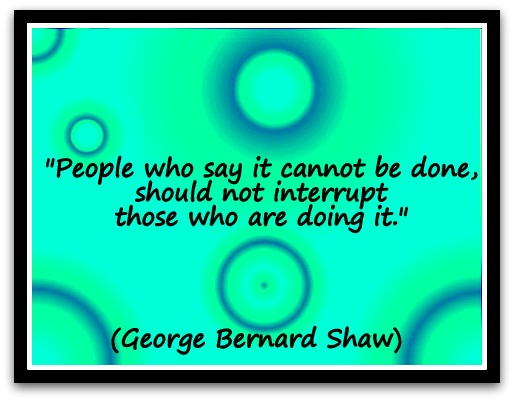
“People who say it cannot be done, should not interrupt those who are doing it.”
(George Bernard Shaw)

“People who say it cannot be done, should not interrupt those who are doing it.”
(George Bernard Shaw)
In this week’s guest post Lorraine Hirst shares some of her experience, thoughts and knowledge as she shares on the topic of mental health.

By Lorraine Hirst
In a new part time role, developing support for young carers in Oxfordshire, and in my freelance work with individuals and teams, I have found myself using and referring to Transactional Analysis theories and tools all the time.
As with all the best learning, if it has been effectively ‘taught’ then it is ‘in the muscle’ and I, we, need only refer to the base theory for clarification. That’s the difference between reading something in a book (many trainers and coaches use TA they have learned from a book) and having become a Transactional Analyst (or certainly on the way to becoming one) via a substantial amount of high quality learning.
At the time, this training was hard work, giving up weekends (three-days ones!), turning down social activities and leaving my son for long days in Oxford city. Looking back from where I am now, it was worth it, along with the monetary cost.
As a participant on a short mental health in young people course right now, I am acutely aware of the difference between training and coaching that will have lasting impact, and that which merely ‘tells’ and ‘informs’.
A Transactional Analysis model:
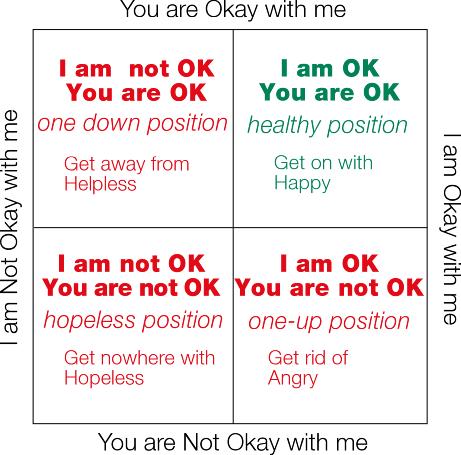
Ernst (1971) OK Corral, the grid to get on with, Transactional Analysis Journal, 1(4), pp 231-240 Colours added by Anita Mountain and quoted in “Working Together; Organizational Transactional Analysis and Business Performance”, pages 9-28, by A. Mountain and C. Davidson, published by Gower in 2011
I would be in an ‘I’m OK, they’re not OK’ position if I was too damning of this recent training, so I am simply comparing the different learning experiences and wishing more were like my TA and previous NLP training, that way everyone would learn in a relational and lasting way. A real Learning Utopia, there’s a wish…!
Anyhow, what exactly did I learn about mental health that may be of use to other coaches, especially those working with young people? Firstly, blending my previous TA experience and the recent mental health training, I would say, ‘it’s OK to not be OK.’
Mental health issues affect 1 in 4 of us. One of the participants on the course gave us a surprising statistic, in that this figure rises to 1 in 3 of those who go to university and 1 in 2 of those at Oxbridge. I suggest that these statistics tell us something about our results-driven Education system and it’s effect on mental well-being, although my husband was erring more towards the notion of ‘genius being closer to madness!’ I’m not subscribing to that theory myself.
Another fact is that suicide is the second most common cause of death in the 15-24 age bracket in the UK. Of course, it’s not OK to be suicidal, this is the extreme of not being OK, in TA terms. We may know all the risk factors that may lead to this position for a young person, economic disadvantage, abuse or poor home life, poor academic performance, but also stress, bullying and discrimination are factors.
Much of the time, as coaches with parents and young people, we may not be able to do anything about the socio-economic or environmental factors for a young person (but I have know situations where moving school can bring great positive changes for some children, where bullying has been a problem, for instance. Having said this, I would warn some parents against ‘over-protecting’ their child, i.e. moving them repeatedly whenever there is an issue at a new school).
What we can do is be mindful of all the risk factors and at the same time build inner resilience in that child, as well as support parents and teachers with these tools.
Something else to be mindful of is that the psychological effects of early puberty in boys generally results in higher self esteem, whereas this has a negative impact on girls at the same stage. Later in puberty, boys tend to have lowered self-esteem and girls level out. This is only a guide but interesting nevertheless.
My recent research into peer pressure suggests that it is not only puberty and biological changes that are going on, but also huge psychological changes, including the heightened ‘thrill-seeking’ effect and great desire to ‘fit in’ and ‘to belong’ (belonging to other groups, not necessarily the nuclear family). At the same time, the executive functioning, the planning part of the brain, is not yet fully-functional. All this combined, means that teenagers are going through a lot and anyone who has of this age will tell you, it can be tough, on everyone.
Although it’s the biggie, it is not only suicide that affects the young, there’s depression, anxiety, self-harm, eating disorders and other issues also deemed ‘disorders’. I don’t like this term at all but this is the mental health lingo – meanwhile they wax lyrical about young people wanting to avoid the stigma and about professionals reducing the impact of labelling!!
So, when is a mental health issue a problem?
When it is impacting on someone’s life (and I would say when it is impacting on the lives of others, say in the case of parental mental health). Therefore, self-harm, in the form of controlled cutting, may not be a problem to a young person, although it may encompass some risks. It is of course a way of coping and it would be more helpful if that young person found some different strategies for dealing with their emotions.
This brings me to the Mental Health First Aid approach. It’s a bit like regular first aid, but for mental health. For this, the wonderful term, ALGEE (pronounced like the stuff that lives in the sea), is used. It stands for:
For most coaches, this approach may be similar to how you work anyway, especially the last ‘E‘. At the same time, it does ‘no harm’, in every sense, to have another model in mind, especially one where the metaphor of green slimy stuff is hard to forget!
My intention in the post is to give others the confidence that helping young people with mental health issues, or indeed anyone with a diagnosed mental health issue, is not rocket science or to be feared. This is not the same as people with mental wellness or poor emotional well-being. As the training noted, someone can have a diagnosis of a mental health problem, such as post-traumatic stress or depression, and have good mental well-being and, conversely, not everyone is experiencing prolonged emotional distress has a diagnosed mental health condition, thankfully.
I hope these terms and ideas have been useful. Here’s to helping people with OK-ness, whether that be slightly not OK or really not very OK at all. Above all, it’s a person’s own choice whether how they are is OK for them or not. Not dissimilar to emotional coaching, the ALGEE steps can guide younger clients towards a more resourceful way of thinking and hopefully a brighter tomorrow. If only we could do the same for the UK weather!
Lorraine is passionate about resilience as a key component in a child’s mental toolbox and as a prerequisite to achievement, whatever that might be for that child. Lorraine delivers emotional resilience-building programmes, known as Way2be.me, in schools and runs workshops for parents and teams. She also works with other creative practitioners to deliver peer mentoring, after-school and holiday clubs, transition projects and targeted programmes for children who are at risk of not meeting their potential or those who need a confidence boost.
Being an emotionally resilient parent, carer or educator is vitally important. Therefore, Lorraine also offers emotional wellbeing sessions for school staff, including school leadership teams. She is has an interest in group theory and context, and works a lot with families and teams where the emphasis is not only on the individual but on the dynamics of the whole group or the effect of the culture within which they are operating.
You can find Lorraine at her website www.way2be.me, or via Linked In.
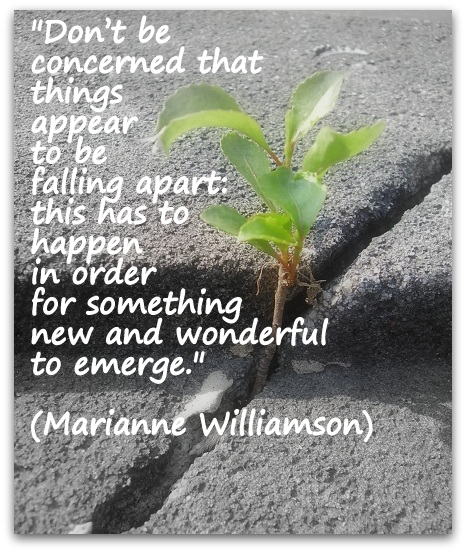
“Don’t be concerned that things appear to be falling apart: this has to happen in order for something new and wonderful to emerge.”
(Marianne Williamson)
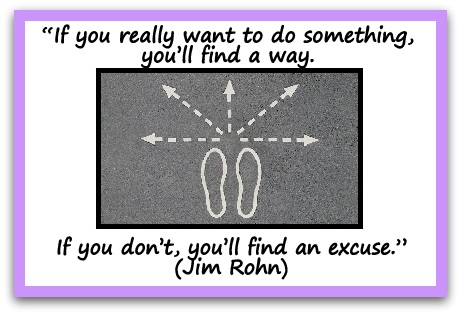
“If you really want to do something, you’ll find a way. If you don’t, you’ll find an excuse.”
(Jim Rohn)

“My teacher once told me – ” No one is perfect……..that is why pencils have erasers.”
(Mahesh Bhatt)
This week’s TED Talk clip is:
Rita Pierson: Every kid needs a champion
Clip length: 7 mins 48 secs
Prefer to watch on TED.com? In that case you’ll need to click here.
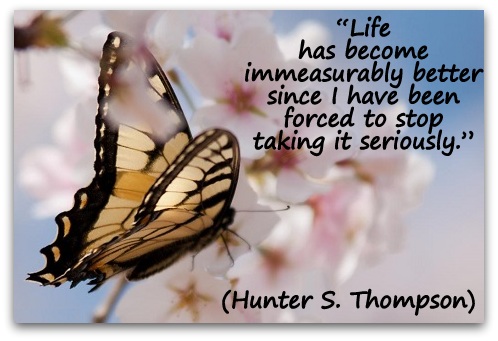
“Life has become immeasurably better since I have been forced to stop taking it seriously.”
(Hunter S. Thompson)

Each Monday I share the most RT’d quote(s) from the blogs twitter account over the previous week.
Last week the most RT’d quote was:
“It is not enough to just do your best work or work hard. You must know what to work on.”
(W. Edwards Deming)
Tweeted on 6th June
The second most RT’d tweet was:
“Let me never fall into the vulgar mistake of dreaming that I am persecuted whenever I am contradicted.”
(Ralph Waldo Emerson)
Tweeted on 8th June

Many thanks to everyone who shared the quotes above and the other quotes from last week. I know that there are various aspects that can influence if a quote attracts your attention – if you saw the tweet, personal style, if it speaks to something happening in your life at that moment etc.

(For those of you as geeky as I am and wondering what tool I’m using to measure individual RT’s this week I’ve been playing with www.twitonomy.com)